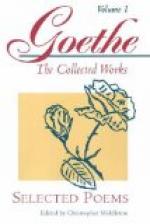1796Ä7. ----- West-Eastern Divan. ----- Who the song would understand, Needs must seek the song’s own land. Who the minstrel understand, Needs must seek the minstrel’s land. -----
The Poems comprised in this collection are written in the Persian style, and are greatly admired by Oriental scholars, for the truthfulness with which the Eastern spirit of poetry is reproduced by the Western minstrel. They were chiefly composed between the years 1814 and 1819, and first given to the world in the latter year. Of the twelve books into which they are divided, that of Suleika will probably be considered the best, from the many graceful love-songs which it contains. The following is Hanoi’s account of the Divan, and may well serve as a substitute for anything I could say respecting it:—
It contains opinions and sentiments on the East, expressed in a series of rich cantos and stanzas full of sweetness and spirit, and all this as enchanting as a harem emitting the most delicious and rare perfumes, and blooming with exquisitely-lovely nymphs with eyebrows painted black, eyes piercing as those of the antelope, arms white as alabaster, and of the most graceful and perfectly-formed shapes, while the heart of the reader beats and grows faint, as did that of the happy Gaspard Debaran, the clown, who, when on the highest step of his ladder, was enabled to peep into the Seraglio of Constantinople—that recess concealed from the inspection of man. Sometimes also the reader may imagine himself indolently stretched on a carpet of Persian softness, luxuriously smoking the yellow tobacco of Turkistan through a long tube of jessamine and amber, while a black slave fans him with a fan of peacock’s feathers, and a little boy presents him with a cup of genuine Mocha. Goethe has put these enchanting and voluptuous customs into poetry, and his verses are so perfect, so harmonious, so tasteful, so soft, that it seems really surprising that he should ever have been able to have brought the German language to this state of suppleness. The charm of the book is inexplicable; it is a votive nosegay sent from the West to the East, composed of the most precious and curious plants: red roses, hortensias like the breast of a spotless maiden, purple digitalis like the long finger of a man, fantastically formed ranunculi, and in the midst of all, silent and tastefully concealed, a tuft of German violets. This nosegay signifies that the West is tired of thin and icy-cold spirituality, and seeks warmth in the strong and healthy bosom of the East.”
Translations are here given of upwards of sixty of the best Poems embraced in the Divan, the number in the original exceeding two hundred. ----- I. MORGAGNI name.
BOOK OF THE MINSTREL.
Talismans.




